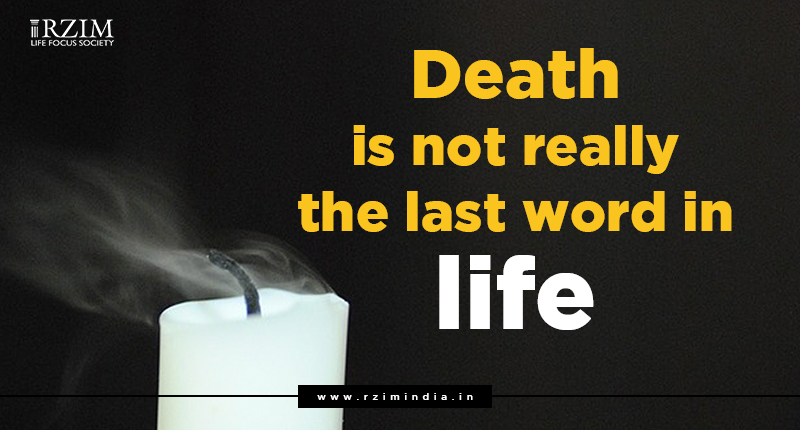The Sting of Death
By Jill Carattini
Researchers not long ago professed to have come up with a questionnaire that could measure a person’s chances of dying within the next four years. According to one of the designers, the test reported to be roughly 81 percent accurate among those who were 50 years or older. Their report, which was published in the Journal of the American Medical Association, claimed the assessment could be useful to doctors in offering prognostic information and to patients who want a more determined look at the future. Regardless of the questionnaire’s effectiveness, however, the headline still struck me as curious: “Test Helps You Predict Chances of Dying.”(1) It brings to mind the lines of Emily Dickinson, “Because I could not stop for Death, He kindly stopped for me.” We don’t need a test to tell us our chances of dying. Death will come for all of us. As RZIM mourns the loss of one of our own today, the bright and kind Nabeel Qureshi, we are reminded that despite its commonality, death’s sting never comes faintly.(2)
British statesman and avowed atheist Roy Hattersley writes in the Guardian of an experience at a funeral. It was a funeral, he said, which almost converted him to the belief that funeral services—of which he has disapproved for years—ought to be encouraged. His conclusion was forged as he sang the hymns and studied the proclamations of a crowd that seemed sincere: “[T]he church is so much better at staging last farewells than non-believers could ever be.”(3) He continues, “‘Death where is thy sting, grave where is thy victory?’ are stupid questions. But even those of us who do not expect salvation find a note of triumph in the burial service. There could be a godless thanksgiving for and celebration of the life of [whomever]. The music might be much the same. But it would not have the uplifting effect without the magnificent, meaningless, words.”(4)
I had never been to a funeral until I was the seminary intern for a small rural church in Oklahoma. I had attended a visitation once and a few memorial services years earlier, but I had never watched a family move from planning to wake to service to burial, until I assisted more families through the entire funeral process than seemed possible for the tiny congregation. We had more than seven times the number of deaths as we had births in the church that year.
When you are given the opportunity to be an observer at that many funerals, something happens. The reality of the sting of death became like a running commentary on the futility of life and the fleeting nature of humanity. “For who knows what is good for a person in life during the few and meaningless days they pass through like a shadow?” asked King Solomon. “Surely the people are grass,” wrote the prophet Isaiah. I had never been more aware of my own transience.
But there was an incredible paradox in this looming experience of death’s repetitive sting. With each new grave came the unnaturalness of the process all over again—a body at the front of the altar, a hole dug deeply, a coffin lowered. Yet as death continued to rear its ugly head in our small community and life stood futile to stop it, the words—God’s words—spoken over the body again and again did not become futile themselves. On the contrary, they grew all the more resounding. I came to realize that our words were not spoken to soften the blow, but rather, to affirm the offense, to acknowledge the sting of death in all of its aberrancy—and to name the one who came to reverse it, having experienced the cold and horrifying grasp of death himself.
We are the only creatures in this world who ceremoniously bury their dead, who speak words over bodies, over our friends and loved ones, and take them all the way to the grave. Why does death never cease to seem unnatural even despite the worldview we bring to the funeral? What is it about this spirit that will not stop, that refuses to be reconciled to loss and simply give death the last word? What is it that makes us cry out to someplace or someone beyond the self? “If for this life only we have hoped in Christ,” writes one whose life, like Nabeel’s, dramatically shifted after meeting Jesus, “we are of all people most to be pitied.”(5)
Roy Hattersley concludes his observations with a comment of which he himself has perhaps not plumbed the depths: “Dull would he be of soul (or the humanist equivalent) who is not moved to tears by the exhortation, ‘He died to make us holy, let us live to make men free.’”(6) Such were the final lines the statesman uttered without meaning at the funeral he claimed that moved him without reason.
What if the inherent logic that brings us to the graveside with words and longing hints of a transcendent memory that life was never intended to be cut short—and that death can somehow be overcome? What if the last farewell is not the final word? Indeed, what if the words we speak over our dead were never intended to be our own?
I am the resurrection and the life. He who comes to me will live, even though he dies.
These words of Jesus Christ we will speak over our friend and colleague, knowing in our lament that there is a God who came as flesh, who died and was buried, and who on the third day forever reversed death’s claim. At this funeral and many others to come, we will be moved because the victorious Jesus, and not death’s piercing sting, is the last and remaining word.
Jill Carattini is managing editor of A Slice of Infinity at Ravi Zacharias International Ministries in Atlanta, Georgia.
(1) “Test Helps You Predict Chances of Dying,” Forbes News Online, February 14, 2006, accessed March 10, 2006.
(2) Ravi Zacharias, “Why this Muslim-turned-Christian speaker resonated with so many before his death at 34,” Washington Post, September 17, 2017.
(3) Roy Hattersley, “A Decent Send-off,” The Guardian, January 16, 2006, accessed March 10, 2006.
(4) Ibid.
(5) 1 Corinthians 15:19.
(6) Hattersley, ibid.
This article was originally published in A Slice of Infinity on September 18, 2017


There are no comments